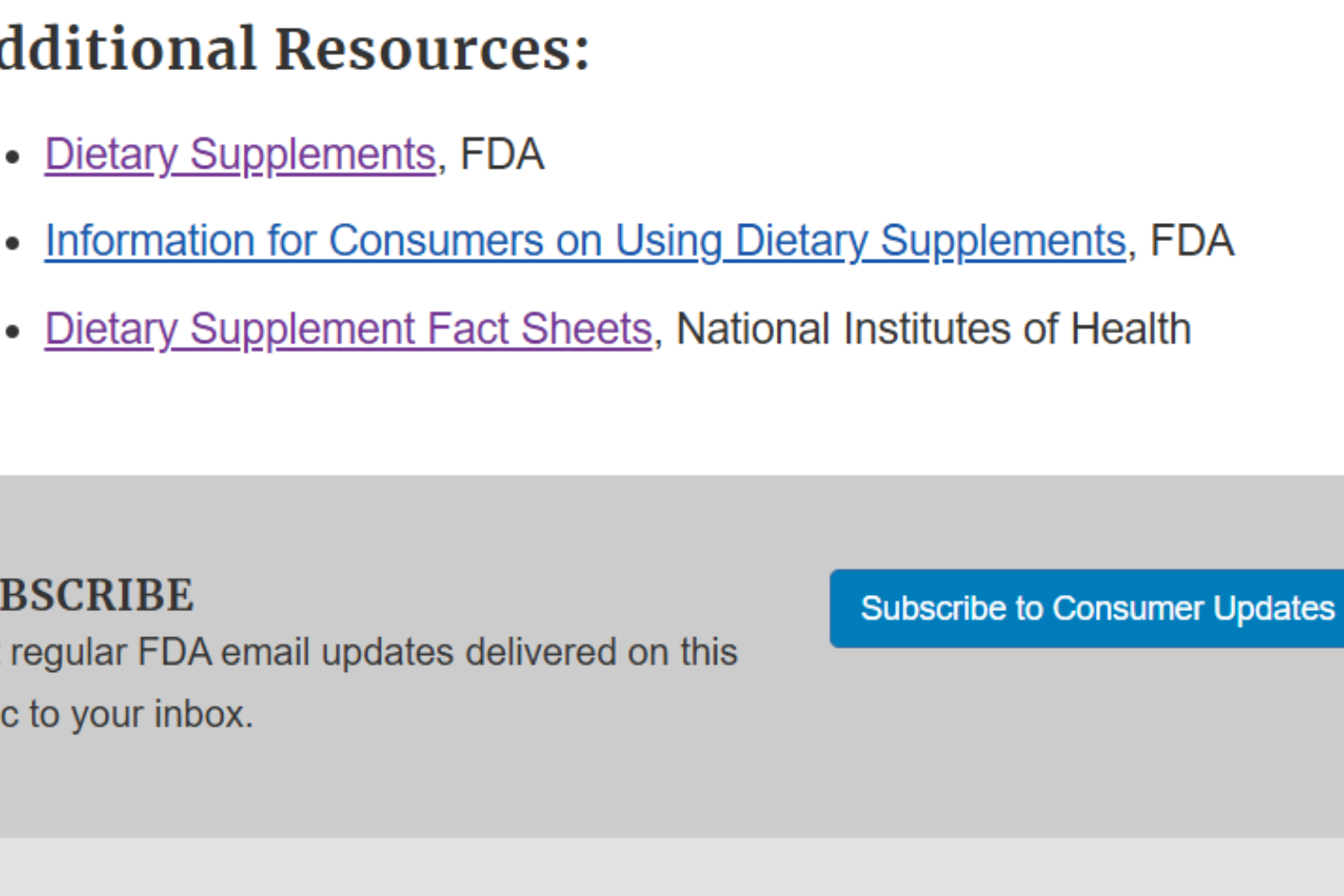Staying compliant with evolving FDA regulations and FTC guidelines is essential for protecting your product’s marketability, safety, and consumer trust. The FDA regulates human and veterinary drugs, medical devices, cosmetics, biological products, and the nation’s food supply to promote safety, accurate labeling, and public health standards. However, the FDA does not pre-approve cosmetics but focuses on post-market safety and labeling compliance.
Similarly, the FTC safeguards public interests by enforcing truthful advertising standards. Monitoring these regulatory changes is vital to assuring your nutrition or supplement brand remains compliant. This guide offers actionable strategies to align your products with FDA and FTC requirements while protecting public health and securing your business’s future.

Why It’s Important to Monitor Regulatory Changes for Your Product
Regulatory changes from the FDA and FTC can directly impact how your products are manufactured, marketed, and sold. Staying ahead of these updates is essential for ensuring compliance, protecting public health, and maintaining your brand’s reputation.
Ensuring Long-Term Compliance
Monitoring updates to FDA regulations is critical to maintaining compliance, avoiding legal penalties, and protecting your brand’s reputation. The FDA is responsible for assuring the safety and efficacy of human and veterinary drugs, biological products, medical devices, and the nation’s food supply.
Staying informed ensures your products meet current standards. This proactive approach helps prevent costly recalls, fines, or damage to your brand’s trustworthiness.
Adapting to New Marketing and Labeling Guidelines
Marketing and product labeling regulations, including claims about safety, health benefits, or efficacy, often evolve. Adapting to these changes ensures that your product remains compliant and competitive.
Updates to labeling requirements for cosmetics, dietary supplements, or food products may necessitate reviewing formulations or updating language to better align with FDA and FTC guidelines. Staying informed helps your brand align with regulatory requirements and supports the dissemination of accurate product information to consumers.

Tools and Resources for Monitoring FDA Regulation Changes
Keeping track of regulatory updates may seem challenging, but leveraging reliable tools and resources simplifies the process. Below are practical methods to stay informed about FDA regulation changes and ensure compliance with public health standards.
FDA’s Website and Email Updates
How to Use the FDA’s Website
The FDA’s website is a comprehensive resource for regulatory updates. Key sections to monitor include the Dietary Supplements section for ingredient requirements and the New Dietary Ingredient (NDI) notifications page, which lists updated compliance guidelines for supplement manufacturers. Regularly visiting these sections helps ensure your products meet the latest standards.
Subscribe to FDA Email Alerts
Signing up for FDA email alerts keeps you informed about regulatory changes, recalls, and industry guidance. By subscribing to tailored updates for topics like food safety or medical devices, you’ll receive timely notifications directly in your inbox, helping you stay ahead of potential impacts on your products.

Regulatory News Platforms
Platforms like Regulatory Focus and NutraIngredients provide focused insights into health and wellness regulations. These news sources cover new laws, proposed updates, and emerging trends in FDA and FTC oversight. Regularly checking such platforms keeps you informed and prepared to adjust your compliance strategies as needed.
Industry Associations and Trade Organizations
Joining Industry Groups for Updates
Trade organizations like the Council for Responsible Nutrition (CRN) and the Natural Products Association (NPA) offer valuable resources for staying informed on regulatory updates. These associations provide members access to advocacy efforts, compliance tools, and industry-specific guidance tailored to protecting the nation’s food supply and public health.
Benefits of Industry Webinars and Conferences
Participating in webinars, conferences, or training events hosted by industry groups offers these benefits:
- Access to Expert Insights: Learn about upcoming regulatory changes directly from FDA and FTC officials or industry leaders.
- Networking Opportunities: Connect with peers and experts who can guide compliance challenges.
- Real-Time Updates: Gain immediate information on pressing issues, such as revisions to biological product standards or changes affecting cosmetics and dietary supplements.
Staying involved with industry events ensures your brand remains ahead of regulatory updates and aligned with public health goals.
Tools and Resources for Monitoring FTC Regulation Changes
Staying informed about FTC regulatory changes is crucial for maintaining compliance in advertising and marketing practices. Below are vital tools and resources to help businesses track updates and enforcement actions.
FTC Website and Enforcement Updates
Subscribe to FTC Consumer Protection Updates
The FTC’s Consumer Protection Updates and Business Blog are valuable resources for staying informed about advertising and marketing regulations. You can receive regular updates on policy changes, enforcement actions, and best practices directly to your inbox by subscribing. This ensures you remain aware of evolving guidelines affecting your product claims and promotional strategies.
Monitoring FTC Legal Actions
Tracking recent FTC legal actions is vital for understanding how regulatory changes impact businesses like yours. Reviewing cases provides insights into compliance risks and helps you adapt your strategies. Key benefits include:
- Learning from Others: Identify common advertising mistakes and how businesses addressed enforcement actions.
- Preventing Violations: Understand the legal consequences of non-compliance to avoid similar pitfalls.
- Adapting Strategies: See how regulatory trends influence marketing requirements for health and wellness products.

Legal News and Regulatory Blogs
Following Legal Blogs Focused on FTC Compliance
Legal and regulatory blogs, such as the FTC Business Blog and Truth in Advertising, are excellent resources for staying informed. These platforms provide analysis of FTC actions, case studies, and marketing compliance tips tailored to businesses. Regularly following these blogs can help you anticipate changes and align your practices with FTC regulations.
Engaging with Regulatory Consultants and Legal Experts
Regulatory consultants can offer tailored guidance to comply with FDA and FTC regulations specific to your product category. By working with consultants, you can adjust your compliance strategies efficiently and mitigate risks tied to evolving guidelines.
Legal Experts for FDA and FTC Compliance
When to Involve Legal Experts
Hiring legal experts is crucial when new FDA or FTC regulations directly impact your product. For example, changes to labeling requirements, advertising claims, or ingredient disclosures may necessitate expert advice to ensure compliance and avoid penalties.
Regular Audits and Compliance Reviews
Legal experts can review your product labels, marketing materials, and formulations for potential compliance issues. These reviews help identify potential compliance issues, ensuring your products meet FDA safety standards and align with FTC guidelines for truthful advertising. For dietary supplements, compliance focuses on safety and labeling rather than efficacy. Regular audits protect your brand’s reputation and minimize legal risks.
Proactive Steps for Staying Ahead of Regulatory Changes
Taking proactive steps to monitor FDA and FTC updates ensures your product remains compliant and competitive. These strategies help you stay informed and adapt quickly to regulatory changes.
Set Up Google Alerts for FDA and FTC Changes
Creating Google Alerts for specific keywords is an effective way to stay updated on regulatory news. Set alerts for terms like “FDA dietary supplement regulations” or “FTC marketing rules” to receive notifications whenever relevant news, laws, or guidelines are published. This real-time monitoring allows you to address potential impacts on your business promptly.
Regular Review of Labeling and Marketing Materials
Updating Claims and Disclaimers
It’s crucial to review your product claims and disclaimers whenever new FDA or FTC guidelines are released. Review health claims, statements, and disclaimers to ensure they adhere to updated regulatory requirements and reduce non-compliance risk.
Adapting to Ingredient Changes
Changes to ingredient safety profiles or new scientific studies can necessitate labeling updates. Regularly reviewing ingredient information helps align your products with FDA safety standards and FTC guidelines, minimizing risks to your brand and customers.
Participating in FDA and FTC Rulemaking Process
Engaging in the rulemaking process helps businesses shape regulations and stay ahead of changes. Participation provides valuable insights into potential regulatory shifts affecting your product category.
Submitting Comments on Proposed Rules
The FDA and FTC often invite public comments on proposed regulations. Submitting thoughtful comments allows businesses to voice concerns or suggest improvements to rules that could impact your products. This engagement ensures your perspective is considered when shaping future regulations.
Attending Public Meetings and Workshops
Attending FDA and FTC public meetings or workshops offers several benefits:
- Insight into Upcoming Changes: Gain early knowledge of potential regulatory updates.
- Direct Interaction with Regulators: Ask questions and clarify uncertainties about proposed rules.
- Networking Opportunities: Connect with industry peers and experts to share insights on compliance challenges.
- Guidance for Business Strategies: Understand how proposed rules may affect your product, allowing you to plan ahead.
Participating in these events keeps your business informed and prepared to navigate regulatory landscapes effectively.
Staying Ahead of FDA and FTC Regulations
Staying informed about FDA and FTC regulatory changes helps businesses maintain compliance, align with public health standards, and protect their brand’s credibility. Leveraging resources such as FDA email alerts, regulatory news platforms, and industry consultants can help you monitor updates and make necessary adjustments to your product. For businesses navigating complex regulations, partnering with experts ensures your product meets evolving standards, safeguarding your reputation and long-term success.
Frequently Asked Questions
How can I stay updated on changes to FDA regulations?
You can sign up for FDA email alerts, follow regulatory news platforms, and review the FDA website regularly for updates.
What resources are available for monitoring FTC guidelines?
Utilize the FTC Business Blog, Consumer Protection Updates, and legal blogs focused on compliance to track regulatory changes.
When should I hire a legal expert to review my product’s compliance?
Consult a legal expert when new regulations impact your product’s labeling, marketing claims, or ingredient formulations.
What are the benefits of participating in FDA or FTC rulemaking?
Engaging in rulemaking lets you provide feedback on proposed regulations and gain insights into upcoming changes.
How can Google Alerts help me monitor regulatory updates?
Google Alerts notify you about new content related to keywords like “FDA dietary supplement regulations” or “FTC marketing rules.”
References
- U.S. Food and Drug Administration. (2022). FDA Authority Over Cosmetics. https://www.fda.gov/cosmetics/cosmetics-laws-regulations/fda-authority-over-cosmetics-how-cosmetics-are-not-fda-approved-are-fda-regulated
- U.S. Food and Drug Administration. (2024). FDA Recall Policy for Cosmetics. https://www.fda.gov/cosmetics/cosmetics-compliance-enforcement/fda-recall-policy-cosmetics
- U.S. Food and Drug Administration. (2024). The Office of Prescription Drug Promotion (OPDP). https://www.fda.gov/about-fda/cder-offices-and-divisions/office-prescription-drug-promotion-opdp



